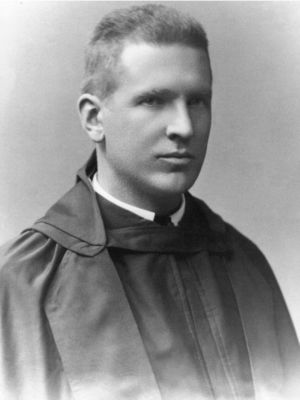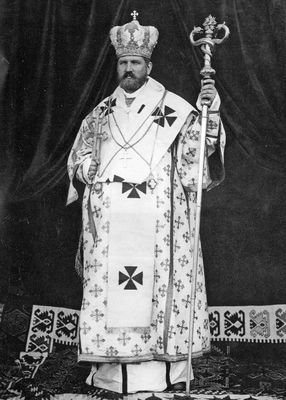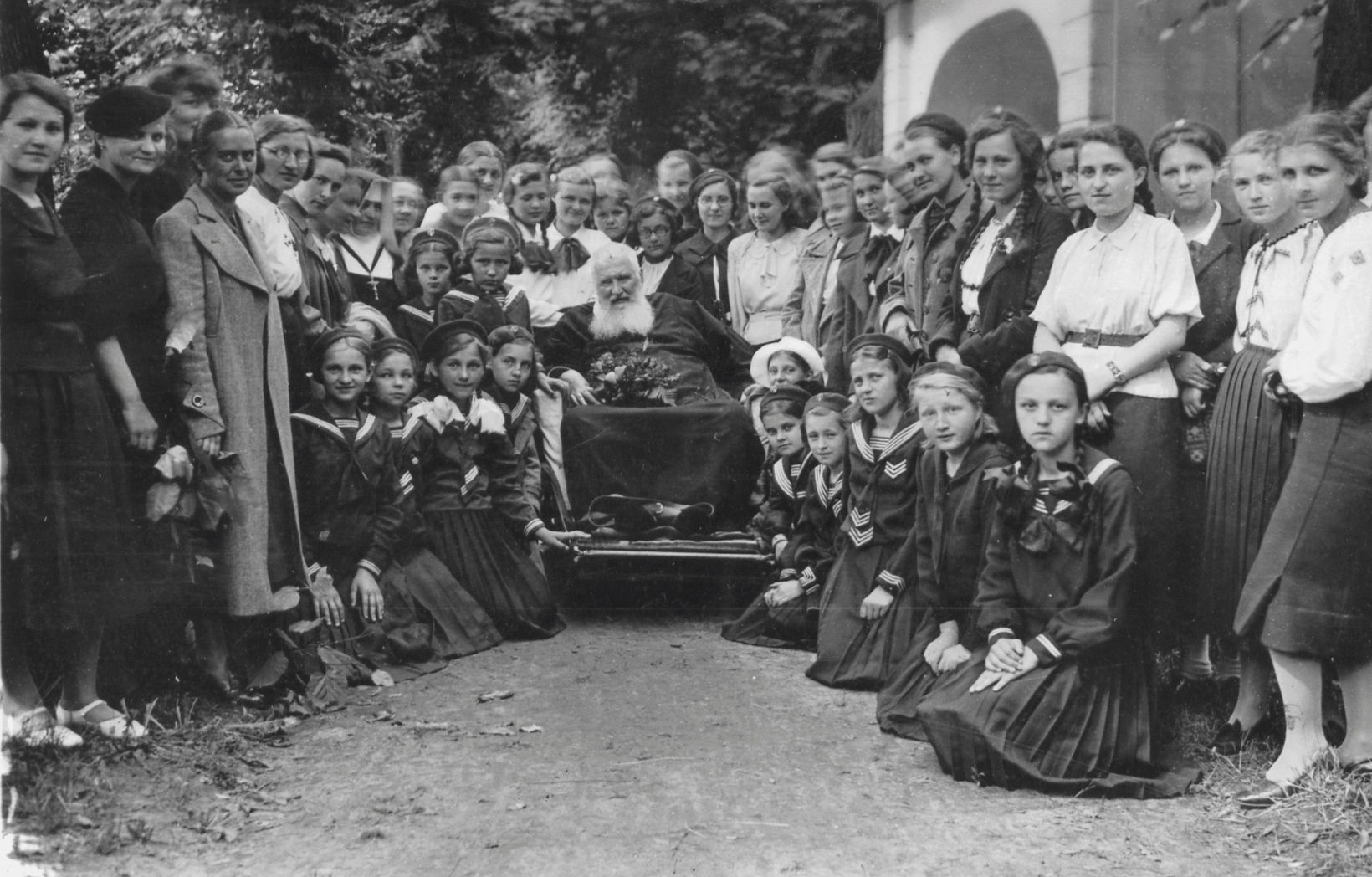6. Metropolitan Sheptytsky 1865–1944
 Andrey Sheptytsky - Monk of the Dobromyl Monastery OSBM, 1888–1892
The life and work of Metropolitan Sheptytsky had a tremendous impact on the Ukrainian Church. He was one of the first bishops of the UGCC to begin using the Ukrainian vernacular to communicate with the faithful. Under his leadership, the Greek-Catholic Church became an extensive and influential institution, an important agent of consolidation and spiritual support in the struggle for Ukrainian statehood.
Andrey Sheptytsky - Monk of the Dobromyl Monastery OSBM, 1888–1892
The life and work of Metropolitan Sheptytsky had a tremendous impact on the Ukrainian Church. He was one of the first bishops of the UGCC to begin using the Ukrainian vernacular to communicate with the faithful. Under his leadership, the Greek-Catholic Church became an extensive and influential institution, an important agent of consolidation and spiritual support in the struggle for Ukrainian statehood.
Metropolitan Sheptytsky was born into an old Ukrainian family. During his formative years he received a broad education in the multi-confessional and multinational Austro-Hungarian Empire. After entering the Basilian monastery in Dobromyl in 1888, he took the monastic name Andrew. He studied philosophy and theology in Krakow and then law in Munich, earning doctoral degrees in Theology and Philosophy. In 1899 Sheptytsky was nominated bishop of the Stanislav eparchy and in 1900 — Metropolitan of Galicia.
There were few important areas of public life in which the Metropolitan did not take an active part. He supported young Ukrainian artists by providing them with scholarships for education in the best schools of Europe. He allocated money to buy a building to accommodate the art school led by the famous Olexa Nowakowski. In 1905 he founded the Ukrainian National Museum and acquired a building for that purpose. Thanks to Sheptytsky’s efforts, the museum owns one of the largest collections of icons in Europe. He himself donated nearly 10,000 objects from his private collection to the museum and funded its maintenance. He also supported the activities of the Ukrainian cultural and educational societies “Prosvita”, “Narodna (Native) School”, and “Farmer”.
In the public life of Galicia, the Metropolitan was known for his ardent political activism. As the Galician Metropolitan, he was a member of the Austrian parliament and Galician Sejm, and this gave him the opportunity to advocate for the rights of Ukrainians. Sheptytsky’s support of the Habsburg Monarchy during World War I led to his arrest and imprisonment during the Russian occupation of Galicia in 1914–1917. After the war, he, along with the Greek-Catholic episcopate, supported the West Ukrainian People’s Republic, which Galician-Ukrainian national activists proclaimed after the collapse of Austro-Hungary in 1918. During the interwar period, he directed his efforts and used his diplomatic ties to secure the rights of Ukrainians in the newly created Poland.
Also at this time, Metropolitan Andrey continued to work to build up the Church. On his initiative, the Lviv Theological Academy was founded in 1928. This institution, led by the Rev. Dr. Yosyf Slipy, was meant to develop into a full-fledged university along the lines Western European higher education institutions.
 Metropolitan Andrey Sheptytsky, 1901
An important place in the activities of Metropolitan were the attempts to reunify the Christian Churches and returning the Slavic East to the Holy See. Throughout his life Sheptytsky maintained contact with the supporters of the Uniate movement, such as the Russian philosopher Vladimir Solovyov, the Croatian Archbishop Joseph Strossmayer, the Belgian Archbishop and Cardinal Désiré-Joseph Mercier, a renowned advocate of the dialogue with the Anglican Church, and the German theologian Maximilian of Saxony, a specialist in the field of Eastern liturgical traditions. The Metropolitan contributed to the development of the Russian Greek-Catholic Church. For this purpose he twice visited Russia in 1907 and 1912, and Belarus. In March 1917 Pope Pius X granted Sheptytsky the right to lead pastoral work among Eastern Rite Catholics in eastern Ukraine and Russia, organized the Synod of the Catholic Church in Petrograd, and appointed the Rev. Leonid Fedorov Exarch for Catholics of the Byzantine Rite in Russia. Sheptytsky also initiated the Velehrad Congresses devoted to Christian unity.
Metropolitan Andrey Sheptytsky, 1901
An important place in the activities of Metropolitan were the attempts to reunify the Christian Churches and returning the Slavic East to the Holy See. Throughout his life Sheptytsky maintained contact with the supporters of the Uniate movement, such as the Russian philosopher Vladimir Solovyov, the Croatian Archbishop Joseph Strossmayer, the Belgian Archbishop and Cardinal Désiré-Joseph Mercier, a renowned advocate of the dialogue with the Anglican Church, and the German theologian Maximilian of Saxony, a specialist in the field of Eastern liturgical traditions. The Metropolitan contributed to the development of the Russian Greek-Catholic Church. For this purpose he twice visited Russia in 1907 and 1912, and Belarus. In March 1917 Pope Pius X granted Sheptytsky the right to lead pastoral work among Eastern Rite Catholics in eastern Ukraine and Russia, organized the Synod of the Catholic Church in Petrograd, and appointed the Rev. Leonid Fedorov Exarch for Catholics of the Byzantine Rite in Russia. Sheptytsky also initiated the Velehrad Congresses devoted to Christian unity.
In the same ecumenical spirit, the Metropolitan introduced a number of reforms in the UGCC aimed at revitalizing the spirit of Eastern Christianity. In 1906, he created a Studite monastery, headed by the Metropolitan’s brother Clement Sheptytsky¸ and in 1913 he created the eastern branch of the Redemptorist Fathers and convents for Studites and Myrrhbearers. In the interwar era, Metropolitan Sheptytsky openly condemned the religious policy of the Polish government with regard to Orthodox Christians and spoke out on their behalf in open letters.
The Metropolitan’s activities during the Second World War, according to the Parliament of Canada, was an “enduring example of commitment to fundamental human rights as humankind’s highest obligation.”
Sheptytsky provided self-sacrificing help to Jews during the tragic times of the Holocaust. Risking his own life, the Metropolitan saved about a hundred Jews, mostly children. His pastoral message “Thou shalt not kill” from November 1942 condemned the violent killing of anyone and for any reason. In a letter to Pope Pius XXII, the Ukrainian Metropolitan sharply condemned Nazi ideology and defended the Jewish population.
Metropolitan Sheptytsky died on November 1, 1944 and is buried in the crypt of St. George’s Cathedral in Lviv.
